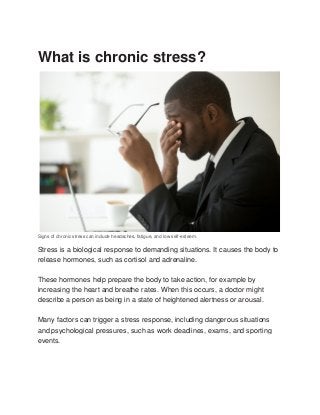
What is chronic stress?
- 1. What is chronic stress? Signs of chronic stress can include headaches, fatigue, and low self-esteem. Stress is a biological response to demanding situations. It causes the body to release hormones, such as cortisol and adrenaline. These hormones help prepare the body to take action, for example by increasing the heart and breathe rates. When this occurs, a doctor might describe a person as being in a state of heightened alertness or arousal. Many factors can trigger a stress response, including dangerous situations and psychological pressures, such as work deadlines, exams, and sporting events.
- 2. The physical effects of stress usually do not last long. However, some people find themselves in a nearly constant state of heightened alertness. This is chronic stress. Some potential causes of chronic stress include: high-pressure jobs financial difficulties challenging relationships Chronic stress puts pressure on the body for an extended period. This can cause a range of symptoms and increase the risk of developing certain illnesses. Signs and symptoms Chronic stress affects the whole body. It can have several physical or psychological symptoms, which can make functioning on a daily basis more challenging. The type and severity of symptoms vary considerably from person to person. Signs and symptoms of chronic stress can include: irritability, which can be extreme fatigue headaches difficulty concentrating, or an inability to do so rapid, disorganized thoughts difficulty sleeping
- 3. digestive problems changes in appetite feeling helpless a perceived loss of control low self-esteem loss of sexual desire nervousness frequent infections or illnesses Health consequences Over long periods, chronic stress can contribute to the development of a range of physical and mental disorders, including:
- 5. Chronic stress can contribute to high blood pressure. heart disease high blood pressure diabetes obesity a weakened immune system sexual dysfunction gastrointestinal disorders skin irritation respiratory infections autoimmune diseases insomnia burnout depression anxiety disorders post-traumatic stress disorder, or PTSD schizophrenia Managing stress Chronic stress can seem overwhelming, and a person may feel unable to regain control over their life.
- 6. However, a number of strategies can help to reduce stress levels and improve well-being. Some methods for managing stress include: Understanding the signs and symptoms. These indications can vary, but if a person can recognize their own signals of stress, they will be better able to manage them. Speaking to friends and family. They can provide emotional support and the motivation to take action. Identifying triggers. It is not always possible to avoid triggers of stress. However, taking note of specific triggers can help a person to develop coping and management strategies, which may involve reducing exposure. Exercising regularly. Physical activity increases the body's production of endorphins, which are chemicals that boost the mood and reduce stress. Exercise can involve walking, cycling, running, working out, or playing sports. Trying mindfulness. People who practice this form of meditation use breathing and thought techniques to create an awareness of their body and surroundings. Research suggests that mindfulness can have a positive impact on stress, anxiety, and depression. Improving sleep quality. Getting too little sleep or sleep of poor quality can contribute to stress. Try to get at least 7 hours every night, and set regular times for going to sleep and waking up. Avoid caffeine, eating, and intense physical activity in the hours before bed. It can also help to unwind before sleeping, by listening to music, reading a book, taking a warm bath, or meditating, for example. Treatment
- 7. If strategies such as those listed above are not helping, it is important to see a healthcare professional for advice and support. A doctor may recommend psychological therapy, such as cognitive behavioral therapy (CBT). One established aim of CBT is to help people deal with chronic stress. In structured sessions, a therapist works to enable a person to modify their behaviors, thoughts, and feelings concerning stressors. CBT can also help a person develop tools and coping mechanisms to manage stress responses. Sometimes, a doctor recommends medications to help treat some symptoms of chronic stress. For example, they may prescribe antidepressants to treat anxiety or depression. For people with trouble sleeping, doctors may prescribe sedatives. When to see a doctor Do not try to deal with chronic stress alone. If self-help strategies are not working, a doctor can provide support and advice about treatment options. They can also refer a person to a more specialized healthcare provider, such as a psychologist or psychiatrist. Anyone feeling overwhelmed by stress should see a doctor as soon as possible, especially if they are having suicidal thoughts or using drugs or alcohol to cope. Takeaway Stress is a regular part of daily life. Short-lived stress is generally harmless, but when it lasts and becomes chronic, it can cause a range of symptoms. It can also contribute to the development of physical and mental disorders.
- 8. Self-help techniques include identifying triggers, developing coping and avoidance strategies, reaching out to friends and family, and practicing mindfulness. If these techniques are not working, or if stress is becoming overwhelming, a person should speak to a healthcare professional. Original Source: Related Article: Stress Side Effects on Mental Health